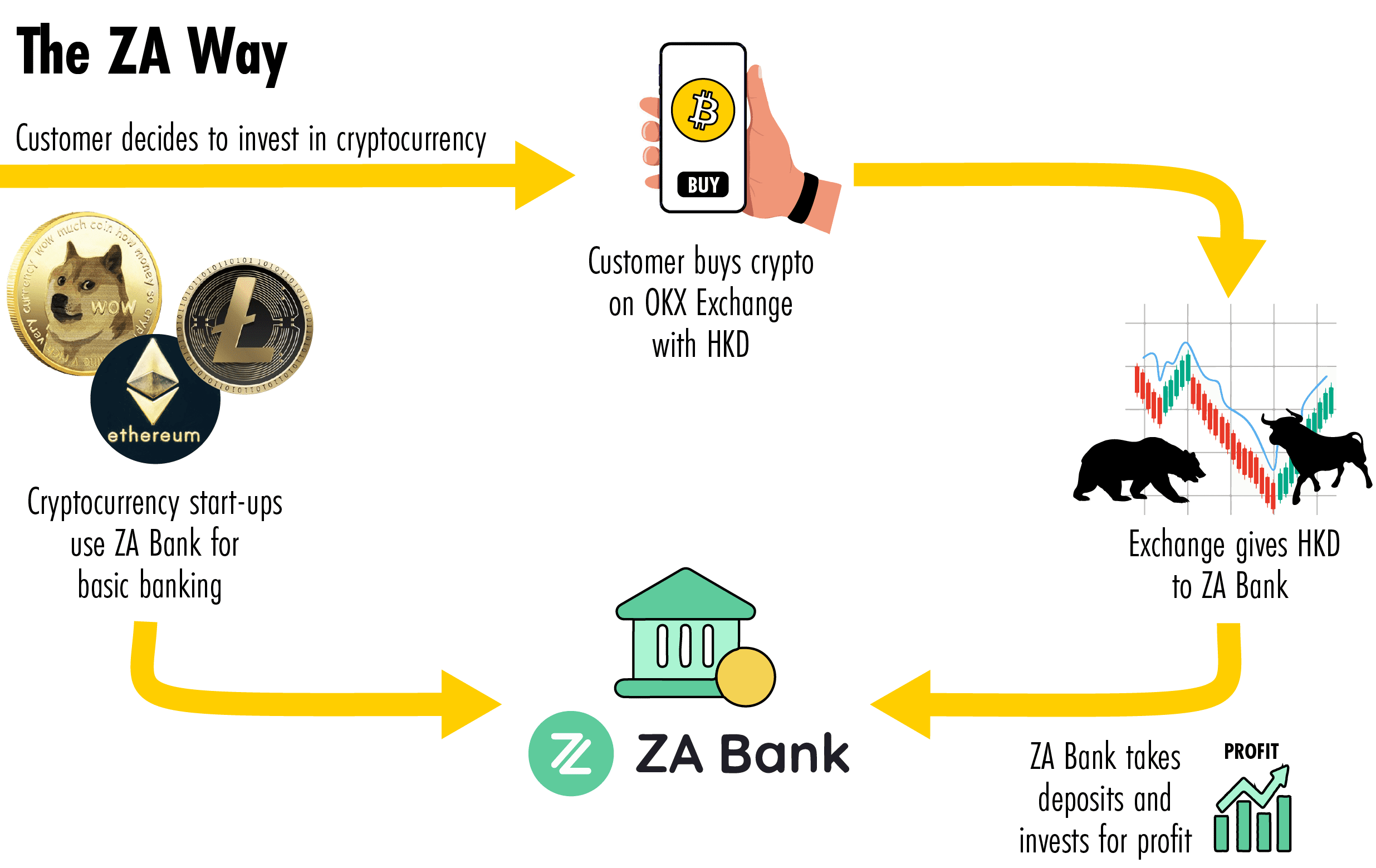
The U.S. crypto industry is in turmoil following the high-profile collapse of exchange FTX as well as two banks that serve the sector. Now start-ups may be finding a refuge in an unexpected place: Hong Kong.

One beneficiary of the city’s apparent embrace of crypto — which has emerged despite Beijing’s long-held wariness of the industry — is online firm ZA Bank. Last week it received official permission to operate as a settlement bank for cryptocurrency start-ups in Hong Kong — the only bank there primarily focused on helping crypto firms exchange digital tokens for mainstream ‘fiat’ currencies.
ZA Bank’s acceptance could be a sign that the Chinese authorities are looking to use Hong Kong as a place to experiment with the technology without exposing the Chinese public to the risks of trading the speculative assets, says Yaya Fanusie, senior fellow at the Center for a New American Security.
“Beijing banned crypto but appears totally on board with the idea that blockchain technology is a strategically important emerging technology,” he says. “They just don’t like pseudonymous transactions and speculation.”
This week, The Wire looks at ZA Bank: the firm’s ties to Chinese online insurer Zhongan Insurance, potential parallels with Silvergate Bank, and what Hong Kong’s crypto openness says about Beijing’s stance on crypto.
THREE HORSE POWER
ZA Bank may now be venturing into crypto but its background lies in the less fevered world of online insurance. Its parent, ZhongAn Online Property and Casualty Insurance, established the bank in 2018, not long after its $11 billion initial public offering that year.
ZhongAn itself benefited from top-notch connections in Chinese tech. Its founder, Ou Yaping, attracted the financial support of three of the sector’s most powerful figures — Alibaba’s Jack Ma, Tencent’s Pony Ma, and Ping An’s Peter Ma — when he set ZhongAn up as China’s first online-only insurance company in 2013. The firm got its start through underwriting the delivery and return costs for Alibaba orders, and benefited from using Alibaba and Tencent data to create hyper-specific policies covering everything from smartphone screens to health and life insurance.

Later, when ZA Bank launched, it took part in Hong Kong’s first ‘virtual bank’ trial, meaning users could access a full-suite of banking services entirely online. It became the first bank in Hong Kong to receive a virtual bank license in 2020, and has since attracted more than 500,000 customers.
CRYPTO TURN
Despite its reputation as Asia’s leading financial center, Hong Kong has a conservative retail banking scene, long dominated by behemoths such as HSBC operating a plethora of branches full of customers enduring lengthy waiting times to be served.
ZA Bank, though, has tried to make its services more palatable to a younger, more tech-savvy customer base: its recent turn to crypto is a natural extension of that effort. It plans to offer two main services: settling transactions to allow licensed exchanges to convert crypto currencies into conventional money like dollars; and providing basic banking services for crypto start-ups.
“Traditional banks… lack experience with crypto products,” says Lily King, chief operating officer of Cobo, a crypto start-up with operations in Hong Kong, adding that ZA Bank’s potential to help crypto firms quickly convert fiat to crypto tokens, and vice versa, would be particularly attractive in attracting crypto firms to the city.

The recent failures of U.S.-based crypto-friendly banks Silvergate and Signature could provide ZA Bank with the opportunity to pick up new customers. But analysts warn there are no guarantees that ZA Bank will avoid the fate of its American predecessors.
Signature and Silvergate collapsed due to a relatively high portion of uninsured deposits, says Steve Massocca, a managing director at Wedbush Securities. To ensure ZA Bank’s success, especially while offering services to the volatile crypto industry, the bank and the Hong Kong government need to ensure that ZA Bank’s assets are safe and can be quickly liquidated.
“All it takes is some deviation in confidence and you’ve got a real problem,” says Massocca.

Hong Kong’s government, meanwhile, is in the throes of a broader charm offensive with the crypto industry. The city recently hosted a four-day, government-supported event aimed at promoting crypto development called the ‘Web3 Festival,’ a name that refers to companies working on crypto and blockchain-related projects.
Its push has come as some American lawmakers are warning that harsh crypto regulation may send U.S. crypto firms fleeing for the exits. At a congressional hearing on Tuesday, Rep. Tom Emmer, a Minnesota Republican, criticized Gary Gensler, chair of the U.S. Securities and Exchange Commission, for being too harsh in cracking down on the crypto industry.
“You are pushing American firms into the hands of the [Chinese Communist Party],” Emmer told Gensler.
Emmer’s critique may have an element of truth, even though Beijing has banned crypto trading since September 2021, says Fanusie at the Center for a New American Security.
“Hong Kong becoming a center for crypto entrepreneurship and innovation does give some leverage to Beijing, because China has control over Hong Kong,” he says. “The question is, how many U.S. entrepreneurs are going to go and set up shop in Hong Kong knowing the political risks there?”

Grady McGregor is a staff writer for The Wire China based in Washington, D.C. He was previously a staff writer at Fortune Magazine in Hong Kong, writing features on business, tech, and all things related to China. Before that, he had stints as a journalist and editor in Jordan, Lebanon, and North Dakota. @GradyMcGregor



